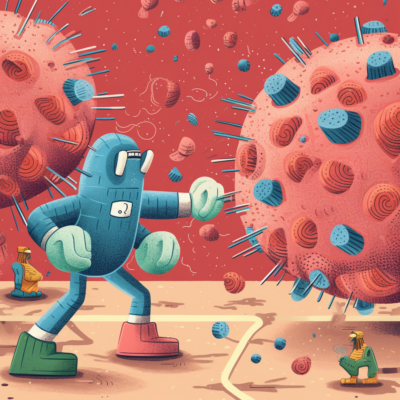Hot-flash med, cell phones and BP, when the gut breaks antibiotics, and more
13 May 2023
Posted by Andrew Kantor
In vitro ain’t in vivo
When researchers test a drug that fights bacteria, they typically test it in a monoculture — a cage match between the drug and the bug. The problem, found University of Wisconsin-Madison biochemists, is that when the drugs are in a real, live human gut, the gut bacteria can limit how effective a drug is against C. diff.
It’s kind of like testing noise-cancelling headphone in a room with a fan, but expecting them to be used at a rave.
Essentially, the drug will kill different bacteria first, leaving C. diff to thrive. Or, put more science-like:
“[P]athogen growth can be altered by inter-species interactions across a wide range of antibiotic concentrations, which should be considered in the design of antibiotic treatments.”

Artist’s conception
A better hot-flash med
The FDA has approved the first medication for hot flashes that doesn’t rely on hormones.
The medication, which goes by the brand name Veozah and generic name fezolinetant, works by blocking the neurokinin 3 receptor, which helps the body regulate temperature.
That “non-hormonal” bit is important — hormone therapies work great, but there are a lot of women who can’t take them — e.g., “patients with a history of stroke, heart attack, vaginal bleeding, blood clots, or liver disease.”
Hang up and relax
Maybe you can tell your patients with hypertension, “Have you considered hanging up the phone?” Chinese scientists — in a retrospective study even they say is chock full of caveats — found that…
… adults who spent that at least a half-hour per week on their mobile phone had a 12% increased risk of developing hypertension, whereas those who spent more than 6 hours weekly had a 25% increased risk, compared with a weekly usage time of under 5 minutes.
The data came from the UK Biobank, so it’s mostly from White middle-aged or older adults, and there were a lot of other limitations. Also, there’s no causal connection — just an association. As usual, more research is needed.
The Long Read: the PBM story
Sure, you know PBMs, but do you really know how they get/got their fingers into the healthcare pie? Vox has everything you wanted to about “How pharmacy benefit managers found themselves the targets of a bipartisan push on drug prices.”
Short Takes
The shortages will continue
Health officials around the world would like to remind people that drug shortages aren’t just related to the pandemic — they’re an ongoing problem thanks to issues “including scarce raw materials, sole-source suppliers, a concentrated market, quality problems and product recalls, labor issues, geopolitical conflict, and natural disasters,” among other issues.
Rexulti label expands
The FDA has expanded its approval for Rexulti to include treating agitation in dementia patients.
Antibacterial plastic
Why spray disinfectant on plastic when you can use nanotechnology to bind chlorhexidine to ABS plastic (i.e., the hard stuff, like Lego) “to create a new antimicrobial coating material that effectively kills bacteria and viruses”?


